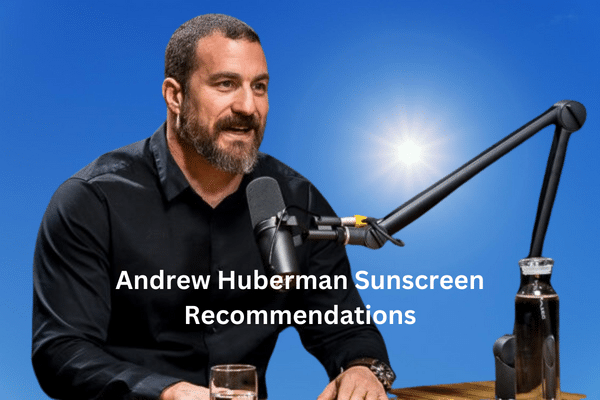Thanks to Andrew Huberman’s podcast, many of us have been gung-ho about optimizing every area of our health, as well as eliminating things that are bad for us. One controversial topic that Huberman has brought to light is sunscreen and EMFs (Electromagnetic Fields). These subjects have become the “third rail” of discussions, sparking debates and concerns among the health-conscious community. To shed light on these matters, who better to turn to than Andrew Huberman?
Dr. Huberman’s expertise in neurobiology gives him a unique perspective on how certain compounds can affect our bodies, including those found in commercial products like sunscreen. In a YouTube video, he points out some critical insights that challenge conventional wisdom and urge us to take a closer look at what we’re putting on our skin.
The Blood-Brain Barrier and Sunscreen
Dr. Huberman emphasizes the existence of compounds in commercial products, including sunscreen, that can cross the blood-brain barrier and potentially harm neurons. These compounds, he states, are indisputably harmful to our neurons. Some sunscreens contain these compounds, which raise concerns about their long-term effects on our health.
In his signature style of diving deep into topics, Huberman has voiced notable apprehensions regarding the chemical UV filters commonly found in a multitude of sunscreen products. In his characteristic meticulousness, he elucidates how specific constituents, such as oxybenzone, possess the ability to permeate the skin and enter the bloodstream.
What keeps Huberman up at night is the potential peril of these chemicals breaching the formidable blood-brain barrier, where they might pose a threat to our precious neurons residing within our brains. This concern strikes a chord because the blood-brain barrier is our brain’s guardian, protecting the delicate neural architecture that endures throughout our lives.
Huberman’s personal stance on sunscreen is as cautious as one would be about melanoma itself, underscoring the gravity of the issue. The presence of sunscreen ingredients cropping up in blood samples and unconventional locales like breast milk and urine serves as concrete evidence that the body indeed absorbs these applied chemicals. In fact, one study conducted in 2020 by the FDA found that seven sunscreen chemicals entered the bloodstream after just one day of use!
RELATED READING: Dr. Andrew Huberman’s Complete Supplement List
Safe Sunscreens: A Tricky Terrain
The question arises: which sunscreens are safe? Dr. Huberman refrains from endorsing specific brand names, as he is researching this topic for a future episode. Sunscreen safety, he believes, is akin to the complex landscape of silicone breast implants. Just as the safety of breast implants depended on various factors, sunscreen safety may vary based on what’s in the product, how it’s used, and individual factors.
While Dr. Huberman refrains from playing favorites with specific sunscreen brands, his insights do point us in a clear direction when it comes to safeguarding our skin from the sun’s rays. Huberman leans towards mineral sunscreens containing ingredients like zinc oxide and titanium dioxide. What sets these protectors apart is their ability to create a protective barrier on the skin’s surface, rather than delving deep within. In essence, these mineral-based sunscreens offer a layer of defense that doesn’t get absorbed by the body.
So, while Huberman doesn’t single out a particular brand, he did offer us a hint as to what sunscreen may be best. In the below Tweet, Huberman references a podcast episode of The Darya Rose Show featuring sunscreen scientist Dr. Brian Diffey.
After listening to the podcast, the clear recommendation of a safe sunscreen is iS Clinical Eclipse SPF 50+.
RELATED READING: Dr. David Sinclair’s Supplement List for Longevity
The Challenge of Objective Exploration
One of the challenges Dr. Huberman highlights is the need for objective exploration. In a world filled with conflicting information, it’s essential to consider all available data. He encourages a balanced approach, acknowledging that some scientists may not always prioritize health or may not appear healthy themselves.
Dr. Huberman’s message is clear: we should approach these topics with open minds, recognizing that sunscreen – while being thought of as safe – can have potential effects on our health. The path to understanding their impact requires careful consideration, ongoing research, and, ideally, platforms like podcasts to promote informed discussions.
In the age of online health and wellness information, it’s essential to bridge the gap between scientific expertise and public understanding. Dr. Huberman’s willingness to engage in meaningful dialogue, as seen in his appearance on podcasts like Tim Ferriss’s, can be a valuable way to share knowledge and help people make informed decisions about their health.
As we continue to explore the mysteries of sunscreen, it’s clear that there are no easy answers. Dr. Huberman reminds us that the pursuit of knowledge demands a commitment to objectivity, openness, and continuous learning.

